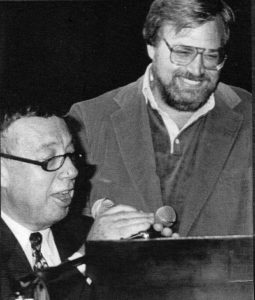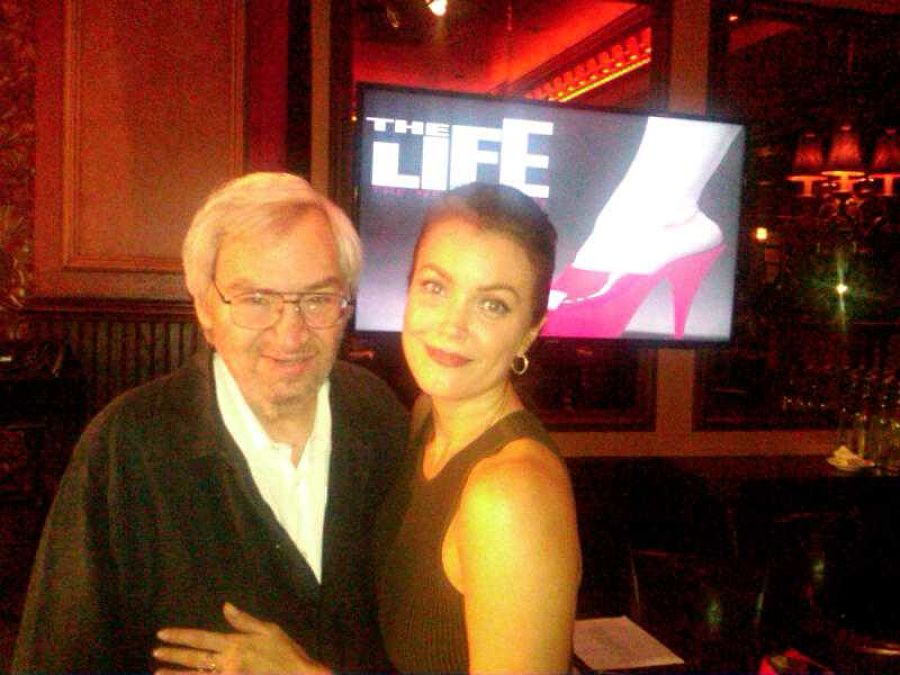The notice in The New York Times said that lyricist Ira Gasman died on Oct. 6 at age 76 having fulfilled his dream of writing for Broadway. Which was true enough, given Ira’s collaboration with legendary composer Cy Coleman on The Life, their multi-award-winning 1997 musical of gritty, sexy, pre-Disney Times Square. But as Ira’s best pal for more than 30 years, I know that he did more than fulfill his dream, he truly lived it—before, during, and after that show—and loved almost every moment.
The extremes of effort, achievement, and disappointment, of course, came in working on the The Life, inspired by an actual scene he saw not far from where his show ultimately played. As he wrote for the program of its London revival, at which my wife and I represented him last year, directed as on Broadway by Michael Blakemore: “I was walking down 42nd Street one night in the early 1980s (probably coming from Theatre Row), when suddenly a police car pulls over to the corner, two guys get arrested while a couple is arguing across the street. What theatre, I thought, right here in the street! It got me thinking about this show—a show about the theatre of hookers and pimps and pickpockets and other hustlers around 42nd Street.”
It took Ira four years to write it, and 10 more years of revision and refinement with Coleman, Blakemore, and screenwriter David Newman as co-librettist to bring the show through workshopping at Westbeth Theater in Greenwich Village and West Side rehearsal rooms to the Ethel Barrymore Theatre.

“I worked in Cy’s old office on 54th Street and in his beautiful house in Southampton, and five or six years later in his new office in his new townhouse on E. 57th St.,” Ira wrote in the London program. “I could work for days just to get two words right, weeks on a full lyric. Then I’d bring it to Cy. who would put it up on his piano and immediately start creating the perfect melody for it. Some might find that maddening. To me it was magical. Cy’s commitment to our show through all that time was extraordinary.”
On Broadway The Life won the 1997 Best Musical Drama Desk Award, Outer Critics Circle Award, and Drama League Award. It received 12 Tony award nominations, winning only for featured actor (Chuck Cooper, as a villainous super-pimp) and featured actress (Lillias White, who brought the house down nightly with her raucous complaint about “getting too old for the oldest profession”). Feeling slighted, an irate Ira called me from the Tony ceremony to say that Radio City Music Hall would “hereafter be known as the scene of the crime.” On the other hand, Ira always treasured the note he got from Stephen Sondheim: “Dear Ira, your work is as good as ever. I saw the show last night. Congratulations.”
That wasn’t Ira’s last hurrah: In 2003, his show Radiant Baby, about the artist and activist Keith Haring, with music by Debra Barsha, played at the New York’s Public Theater and earned a Lucille Lortel Award nomination.
In addition to Coleman and Barsha, Ira worked with such composers as Burton Lane, Jule Styne, Steve Allen, Galt MacDermot, and, most recently, musical director Alex Rybec, on songs for musical theatre, cabaret, TV and films—including for Zero Mostel in The Front, with his first collaborator, Cary Hoffman,
The arc of Ira’s career is a case study in the way show business connections can be made. Here’s how Hoffman, now star of his own My Sinatra concerts, recalls the start: “In 1960 Ira and I were both pledging a fraternity [AEP] at NYU and I sang in a talent contest they had. After I sang this guy approached me and said that he wanted to do a comedy team with me. I asked him if he was a comic or if he had ever been onstage. He said no, but had every confidence that we could do it. Ira’s confidence sold me—and got me into show business!
“We went to the Catskills with no agent, no experience, my singing voice…and Ira’s confidence! We would go to small hotels. Ira would tell them that we were a headlining comedy act from Vegas and we were breaking in some new material on the East Coast. I would just shake my head like I knew what Ira was talking about. Ira traded our ‘act’ for room and board—except for the evenings we bombed. Then we’d sleep in my car.”
Recalled Ira, “It was our version of Dean Martin and Jerry Lewis—Cary with his Sinatra-like voice, and me with the best jokes I could copy from comedy albums in the record store my aunt and uncle owned.”
It was a rocky climb, Hoffman admits: “Our horrendous act ultimately led to Ira and I being out of work a lot.” Then one afternoon they started to write “Heaven Only Knows,” their first song. “We made a demo and took it around to the famous Brill Building, and within two days we were signed by Don Costa as a rock ‘n’ roll songwriting team for $25 weekly. We were not made for rock ‘n’ roll—I worshipped Sinatra and Ira worshipped Cole Porter—but we did manage to have some records made, one by Kenny Rankin. Ira wrote beautiful new words to ‘Greensleeves’ and Sandy Stewart recorded it.”
Eventually they wrote a show called it What’s a Nice Country Like You Doing in a State Like This?, a show Ira described as “a typically topical Nixon-era musical, political, satirical revue.” A young director, Miriam Fond, decided to include it in a series she was producing called “Theatre at Noon” in the basement of St. Peter’s Church on New York’s East Side. The show, starring a young Betty Buckley in her first New York production, “turned out to be a smash—even Sondheim showed up,” Ira recalled. That led to another staging of the show at Wynn Handman’s American Place Theater in 1972, and later to work on another show there, Straws in the Wind, which included songs by Cy Coleman, Betty Comden and Adolph Green, Billy Nichols, Stephen Schwartz, and Galt MacDermot. Ira was paired as a lyricist with MacDermot, the composer of Hair and Two Gentleman of Verona, and his lyrics must have made an impression on Coleman, because 10 years later, when Ira was working on the show that would become The Life, he approached Coleman and the composer’s response was, “Let’s do it.”
To gather more inspiration and material, Ira spent a lot of time with denizens of the old Times Square, sometimes starting at 1 a.m. and sometimes, according to Ira, “paying for their time (but nothing more, I swear).” It was while sitting with some of them at a coffee shop that he first heard references to “Mr. Greed”—not a person, as he explained, but the name for “the impulse that drew the unwary into their sidewalk gambling games,” and which became the title for one of many cheerfully cynical songs in The Life.
Not all of Ira’s connections panned out as well. Back in the 1970s, Ira wanted to make a musical of Paddy Chayefsky’s TV drama and Oscar-winning movie Marty, about the shy bachelor from the Bronx and the sweet but plain girl he meets at a dance, accompanies back to her home, and politely leaves at the door. When Ira saw the scene in which Ernest Borgnine as Marty walks back to the bus stop, his heart so full that he leaps into the air and slaps the bus stop sign as hard as he can, he recalled, “My eyes teared up and I shouted to myself, that’s a musical!”
Sondheim suggested he work with orchestrator/composer Jonathan Tunick, and they went right to it. After they’d written about half a dozen songs, Sondheim called Chayefsky and said two young writers he knew wanted to make a musical of Marty.
“Sondheim liked the songs,” Ira recalled. “So did dance man Bob Fosse, asked by Paddy to attend our audition.” Paddy’s response? Said Ira, “I still remember his exact words: ‘Listen, boys, if I want to make Marty a musical, I’ll write it myself.’ Six months of work and that was that. Well, if you’ll forgive me, that’s show business.” (Rupert Holmes, Charles Strouse, and Lee Adams later wrote a musical of Marty, well after Chayefksy’s death in 1981, though it never made it past a 2002 production at the Huntington Theatre in Boston.)
Years later in a locker room before one of our regular tennis games, Ira told me that Burton Lane had proposed to him that they write a musical of the cross-dressing film comedy Tootsie. But Ira couldn’t see it. “Not my idea,” I think he said. That’s show business too: A musical of Tootsie, with songs by David Yazbek and a book by Robert Horn, is headed for Broadway next spring.
To complete the record, I should note that Ira was born in Brooklyn, went to James Madison High School and NYU, served time as an ad agency VP, where his contributions to pop culture included the line “Bounty: The Quicker Picker-Upper.” He studied musical theatre with Aaron Frankel at the New School for Social Research and was an original member of the BMI Musical Theatre Workshop with Lehman Engel.
In Manhattan, he was a devoted resident of the iconic Gramercy Park Hotel, enjoyed access to its famous fenced-in garden, and loved visiting small clubs around town, especially Don’t Tell Mama, where everybody knew his name and sang his songs.
As my neighbor in Sag Harbor on Long Island, Ira loved tennis in the park, where he’d often try out new lyrics on me; meals at the American Hotel, where Radiant Baby got an early run-through; and music at the piano in the old Bobby Van’s in Bridgehampton, where one of the players found Ira a piano of his own. He left it to me before a worsening bipolar condition forced his move to various care facilities in Virginia to be near his sister Linda and her husband Bart, and where he died of respiratory failure. Also surviving are his niece Allyson Pimentel (Pedro Noguera), nephew Theodore Yeschin (Kate Roughen-Yeschin), and longtime partner Sallie Quirk, an East End artist.
A memorial service in Manhattan is to be announced. Sure to be mentioned is the undying debt Gasman felt to Coleman, who died in 2004. “Cy was the man who gave me my dream and who changed my life,” he wrote in the London program for The Life. “And although I thanked Cy a thousand times, I never thanked him enough.”
Wrote Cy’s widow, Shelby: “Ira wrote an amazing score with Cy on The Life. I still sing snippets of it almost every day. Those lyrics are epic. What a sweet, good man Ira was.”
Their collaboration lives on. When I used live chat recently at nytimes.com to get instructions on filing an obit for a friend I described as lyricist of a musical called The Life on Broadway in 1997, amazingly, the woman at the other end typed: “Oh, now you’ve touched my heart. I love that show,” and rattled off all her favorite songs from it. Somewhere, I trust, Ira and Cy are smiling!
David M. Alpern was a reporter, writer and senior editor at Newsweek, and created the Newsweek On Air network radio broadcast, later independent as For Your Ears Only.


